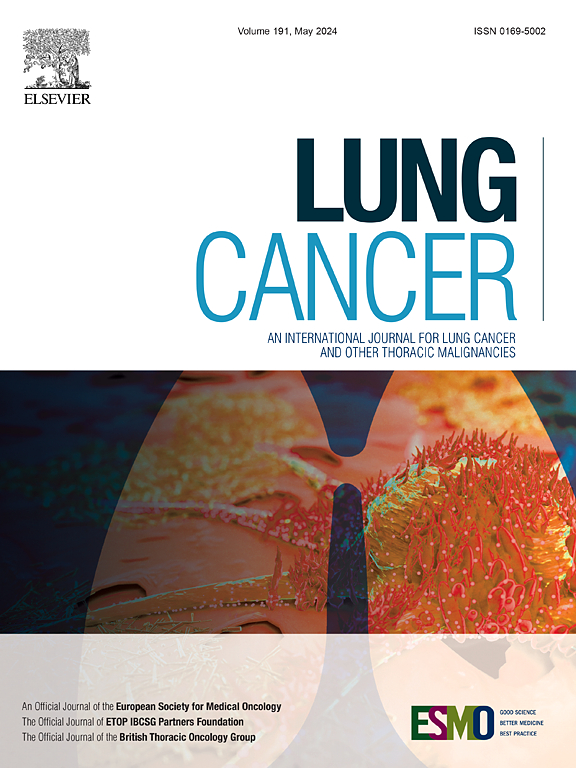Biological impact of chemotherapy during treatment with EGFR tyrosine kinase inhibitors for non-small cell lung cancer positive for EGFR activating mutations
IF 4.4
2区 医学
Q1 ONCOLOGY
引用次数: 0
Abstract
Background
The aim of this study was to explore the biological impact of chemotherapy during epidermal growth factor receptor (EGFR) tyrosine kinase inhibitor (TKI) treatment in individuals with non-small cell lung cancer (NSCLC).
Methods
Plasma and tumor tissue specimens were prospectively collected from NSCLC patients with EGFR activating mutations who participated in a randomized phase III study comparing EGFR-TKI therapy with or without inserted chemotherapy (JCOG1404/WJOG8214L). The specimens were analyzed for genetic mutations by droplet digital polymerase chain reaction analysis and next-generation sequencing.
Results
Two hundred patients were enrolled in this biomarker study, with 113 and 87 individuals receiving EGFR-TKI monotherapy and EGFR-TKI treatment plus inserted chemotherapy, respectively. Although progression-free survival (PFS) for EGFR-TKI monotherapy was shorter in patients with than in those without detectable EGFR activating mutations in cell-free DNA at baseline, inserted chemotherapy improved PFS compared with EGFR-TKI monotherapy for the former patients (median, 17.5 vs. 11.8 months). Inserted chemotherapy suppressed the number of alleles positive for activating and T790M mutations of EGFR in cell-free DNA at disease progression. The benefit of inserted chemotherapy relative to EGFR-TKI monotherapy was more apparent in patients with (median PFS, 18.8 vs. 13.5 months) than in those without detectable concurrent mutations of TP53.
Conclusions
Chemotherapy has the potential to suppress the development of EGFR-TKI resistance as well as to inhibit tumor growth for NSCLC positive for EGFR activating mutations. Our results provide biological insight into combination treatment with EGFR-TKIs and chemotherapy for such patients.
EGFR酪氨酸激酶抑制剂治疗EGFR激活突变阳性的非小细胞肺癌期间化疗的生物学影响
本研究旨在探讨非小细胞肺癌(NSCLC)患者在表皮生长因子受体(EGFR)酪氨酸激酶抑制剂(TKI)治疗期间化疗的生物学影响。方法前瞻性收集EGFR激活突变NSCLC患者的血浆和肿瘤组织标本,这些患者参加了一项比较EGFR- tki治疗与不插入化疗(JCOG1404/WJOG8214L)的随机III期研究。采用液滴数字聚合酶链反应分析和新一代测序对标本进行基因突变分析。结果200例患者入组该生物标志物研究,分别有113例和87例患者接受EGFR-TKI单药治疗和EGFR-TKI治疗加插入化疗。虽然EGFR- tki单药治疗患者的无进展生存期(PFS)比基线时无细胞DNA中未检测到EGFR激活突变的患者短,但与EGFR- tki单药治疗相比,前者患者的插入化疗改善了PFS(中位数,17.5个月对11.8个月)。在疾病进展过程中,插入化疗抑制了无细胞DNA中EGFR激活和T790M突变阳性等位基因的数量。相对于EGFR-TKI单药治疗,插入化疗的益处在有TP53并发突变的患者中更为明显(中位PFS, 18.8个月vs. 13.5个月)。结论对于EGFR激活突变阳性的非小细胞肺癌,化疗具有抑制EGFR- tki耐药发展和抑制肿瘤生长的潜力。我们的研究结果为EGFR-TKIs联合化疗治疗此类患者提供了生物学见解。
本文章由计算机程序翻译,如有差异,请以英文原文为准。
求助全文
约1分钟内获得全文
求助全文
来源期刊

Lung Cancer
医学-呼吸系统
CiteScore
9.40
自引率
3.80%
发文量
407
审稿时长
25 days
期刊介绍:
Lung Cancer is an international publication covering the clinical, translational and basic science of malignancies of the lung and chest region.Original research articles, early reports, review articles, editorials and correspondence covering the prevention, epidemiology and etiology, basic biology, pathology, clinical assessment, surgery, chemotherapy, radiotherapy, combined treatment modalities, other treatment modalities and outcomes of lung cancer are welcome.
 求助内容:
求助内容: 应助结果提醒方式:
应助结果提醒方式:


